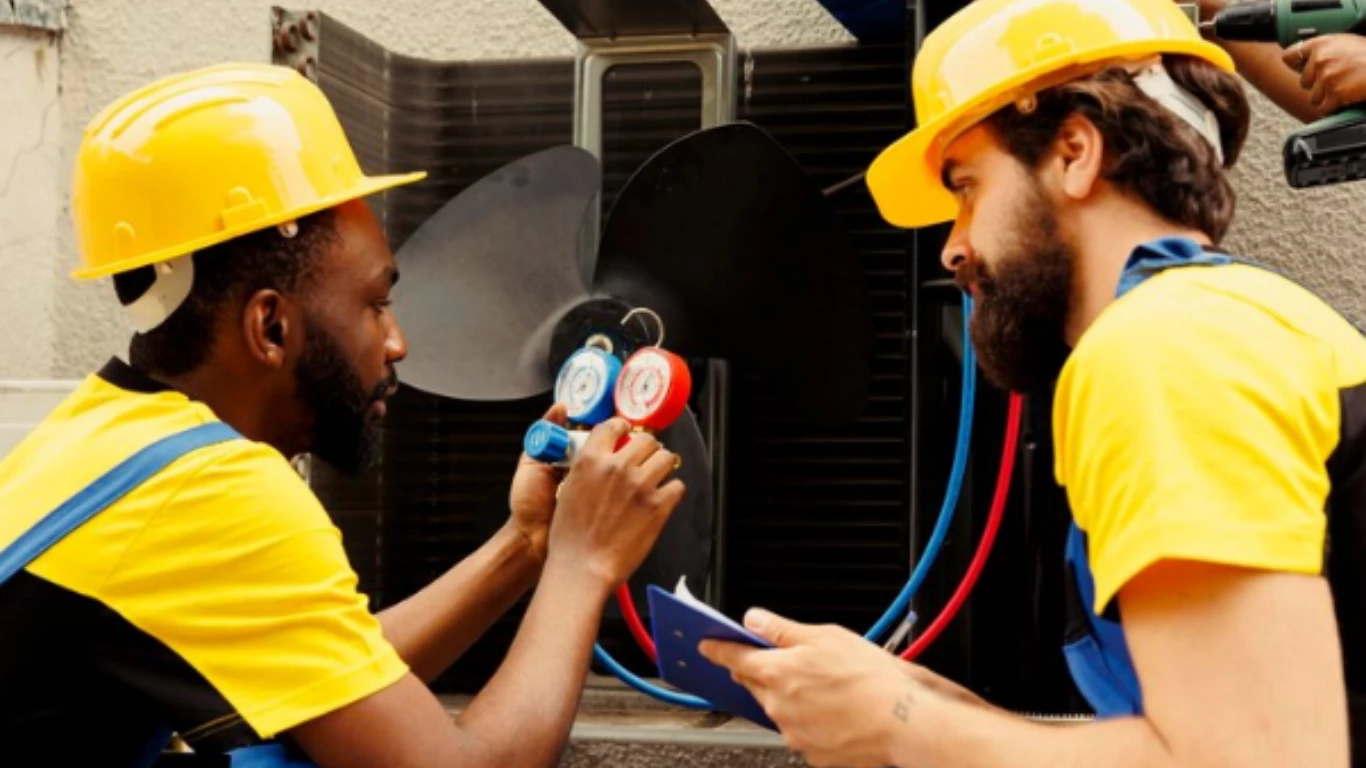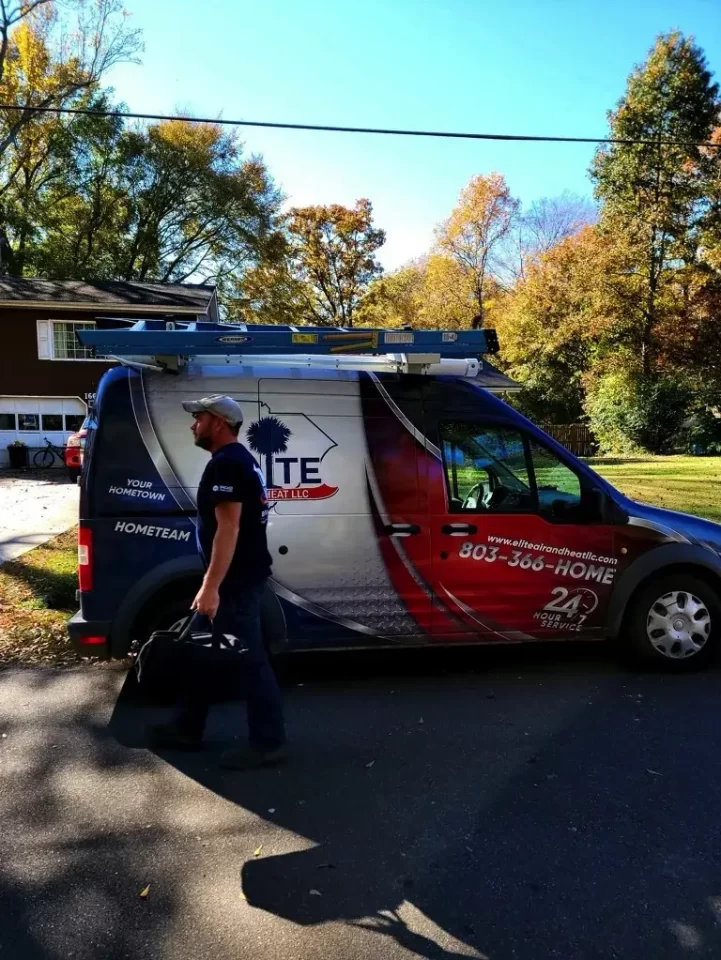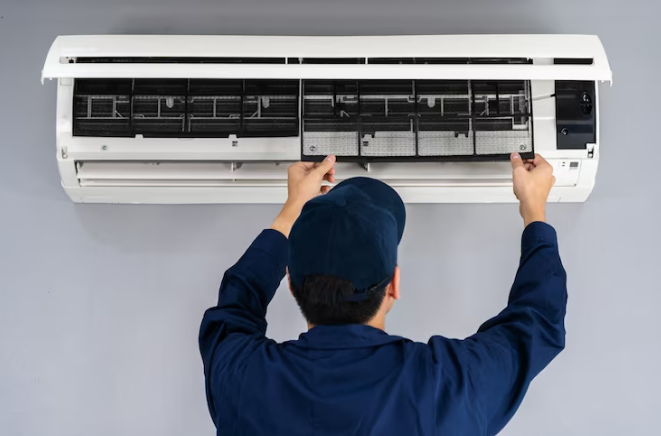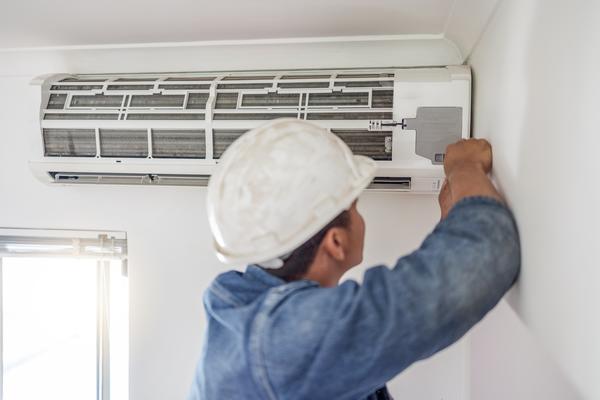Hiring the right HVAC repair technician is crucial for ensuring the efficiency and longevity of your heating, ventilation, and air conditioning systems. Making an informed decision requires knowing what qualifications and standards to look for in a professional. Here are key factors to consider when hiring an HVAC repair technician to ensure you receive the best service possible.
What Certifications Are Necessary For An HVAC Repair Technician?
Certifications are a clear indicator of a technician’s knowledge and commitment to their field. One of the most important certifications is the North American Technician Excellence (NATE) certification. In the business, NATE is well-known as the largest non-profit HVAC technician certification organization. With this qualification, you can be sure that the technician has passed stringent testing and proven to have a deep understanding of HVAC systems.
The Environmental Protection Agency (EPA) 608 Certification is another essential certification. Anyone handling refrigerants is obliged by federal law to have this certification. It ensures that the technician is knowledgeable about safe and environmentally-friendly practices regarding the use of refrigerants.
Additionally, some states and localities may require specific licenses or certifications. It’s important to check the local regulations to ensure that the technician holds all necessary qualifications to legally perform HVAC work in your area.
How Does Experience Impact The Competence Of An HVAC Repair Technician?
Experience is a key factor in determining the competence of an HVAC repair technician. While certifications provide a solid foundation of knowledge, it is hands-on experience that truly hones a technician’s skills and expertise. Here’s why experience is so crucial:
- Real-World Application: Experience allows technicians to apply their theoretical knowledge in practical, real-world situations. They become adept at diagnosing and resolving a wide variety of HVAC issues quickly and effectively.
- Problem-Solving Skills: An experienced technician has likely encountered numerous problems over the years, from simple malfunctions to complex system failures. This exposure equips them with the problem-solving skills needed to address issues efficiently, reducing downtime and ensuring your system runs smoothly.
- Diverse System Knowledge: Technicians who have worked on a range of systems, including both residential and commercial HVAC units, bring a broader skill set to the table. They are familiar with different models, brands, and configurations, making them more versatile and capable of handling any HVAC challenge.
- Ongoing Training and Professional Development: The HVAC sector is always changing, with new techniques and technology appearing on a regular basis. Experienced technicians who engage in ongoing training and professional development stay current with these advancements. This commitment to learning ensures they are always equipped with the latest tools and techniques to provide high-quality service.
- Customer Confidence: Hiring an experienced technician can give you greater confidence in their ability to handle your HVAC needs. Their track record and extensive knowledge mean they are more likely to deliver reliable, efficient, and effective service.
When evaluating a technician’s experience, consider the number of years they have been in the field, the variety of systems they have worked on, and their commitment to ongoing education. An experienced technician not only brings technical proficiency but also the assurance of quality and reliability in maintaining your HVAC system.
What Are The Safety Standards An HVAC Repair Technician Should Meet?
Safety is paramount in HVAC repairs, as it ensures the well-being of technicians, property, and occupants. A qualified HVAC technician must adhere to stringent safety standards. Here’s a closer look at the essential safety measures:
- OSHA Regulations: First and foremost, technicians should follow OSHA (Occupational Safety and Health Administration) regulations. These guidelines cover a comprehensive range of safety practices:
- Proper Use of Personal Protective Equipment (PPE): Technicians must wear appropriate PPE, including gloves, safety glasses, and masks, to protect against injuries and hazardous substances.
- Safe Handling of Electrical Components: Proper procedures must be followed to avoid electrical shocks or fires when working with HVAC systems, which often involve complex electrical wiring.
- NFPA Standards: Knowledge of the National Fire Protection Association (NFPA) standards is crucial for HVAC technicians. These standards address several critical areas:
- Fire Safety and Prevention: Technicians must ensure that HVAC systems are installed and maintained in a way that minimizes fire risks. This includes using fire-resistant materials and following proper procedures.
- Proper Ventilation: Ensuring the safe operation of HVAC systems and preventing the accumulation of hazardous gases require adequate ventilation.
- Safe Handling of Flammable Materials: Many HVAC systems involve flammable refrigerants or gases. Technicians must handle these materials with care to prevent leaks and potential explosions.
- Basic First Aid and Emergency Response: Technicians should be trained in basic first aid and emergency response procedures. In the event of an accident, knowing how to administer first aid or take immediate action can significantly reduce the severity of injuries and mitigate further risks.
- Routine Safety Checks: Regular safety inspections and maintenance of equipment help identify potential hazards before they become serious issues. This proactive approach ensures ongoing safety for both the technician and the client.
By adhering to these safety standards, HVAC technicians can provide secure and reliable service, ensuring the safety of themselves and their clients. When hiring an HVAC technician, verifying their commitment to these safety practices is crucial for peace of mind and a well-maintained system.
How To Verify The Credentials Of An HVAC Repair Technician?
When your HVAC system needs repair, selecting the right technician is crucial for ensuring effective and reliable service. Here’s how you can verify the credentials of an HVAC repair technician to make sure you’re hiring a qualified professional:
- Check for Certification: Ensure the technician is certified by recognized institutions such as the North American Technician Excellence (NATE). Certifications indicate that the technician has met industry standards for knowledge and skills in HVAC repair.
- Verify Licensing: In many states, HVAC technicians must be licensed to practice. You can check with your local or state licensing boards to verify that the technician holds a current and valid license. This also helps ensure that they adhere to state-specific regulations and standards.
- Ask About Experience: Experience matters in the HVAC industry. Inquire about how long the technician has been in the field and their experience with your specific HVAC system model.
- Look for Reviews and References: Check online reviews and ask the technician for references. Speaking to past clients can provide insights into the technician’s reliability, quality of work, and customer service.
- Ensure They Are Insured: Proper insurance protects you from liability in case of accidents or damage to your property during the repair. Confirm that the technician carries liability and workers’ compensation insurance.
Choosing a well-qualified HVAC repair technician is about doing your homework and ensuring they meet all professional standards. This not only protects your investment but also ensures that your HVAC system operates efficiently and safely.
Why Choose Elite Air & Heat LLC?
At Elite Air & Heat LLC, we pride ourselves on being the top choice for HVAC repair services, offering exceptional expertise, certified technicians, and outstanding customer service. Our certified technicians bring extensive experience and continuous training to every job, ensuring safe, high-quality service. We are committed to customer satisfaction, delivering responsive and friendly support for all your HVAC needs.
Frequently Asked Questions
How often should I have my HVAC system serviced?
We advise scheduling at least two annual maintenance appointments for your HVAC system: one in the spring and one in the fall. In addition to ensuring peak performance, routine maintenance can avert future expensive problems.
What should I do if my HVAC system is making unusual noises?
Unusual noises can indicate a variety of issues, from loose components to more serious mechanical problems. It’s best to turn off the system and contact a professional technician immediately to diagnose and fix the problem.
How do I know if I need a repair or a replacement?
Several factors can influence this decision, including the age of your system, the frequency of repairs, and the overall efficiency. Our technicians will conduct a thorough assessment and provide you with honest advice on whether a repair or replacement is the best course of action.
What are the costs involved in HVAC repairs?
Depending on the particular problem and the difficulty of the repair, HVAC costs can change. Our repair services typically cost between $150 and $500. Before beginning any work, we give you thorough estimates so you know exactly what to anticipate.
How can I improve the efficiency of my HVAC system?
Enhancing your HVAC system’s efficiency with programmable thermostats, timely repairs, and routine maintenance will make a big difference. Furthermore, maintaining constant inside temperatures and lessening the strain on your system can be achieved by making sure your house is well insulated and caulking any air leaks.
Ready for Reliable HVAC Service? Contact Us Today!
At Elite Air & Heat LLC, we are dedicated to providing top-quality HVAC repair services that you can trust. Our experienced and certified technicians, commitment to safety, and focus on customer satisfaction make us the best choice for all your HVAC needs.
Don’t wait for a small problem to grow into a big one. Get in touch with us right now to arrange an appointment or discover more about our extensive range of HVAC services.
Experience Comfort and Reliability with Elite Air & Heat LLC!
Ready to experience the Elite Air & Heat LLC difference? Call us now at (803) 366-4663 or visit our website at https://eliteairandheatllc.com/ to book your appointment. Let us help you keep your home or business comfortable and efficient all year round. Your comfort is our priority!




